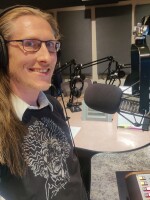The University of New Mexico’s Project ECHO has connected professionals around New Mexico, and the world, to health education using virtual training for decades. But it’s now offering training to teach everyone in New Mexico how to respond to an opioid overdose.
Strategic Support Manager for Project ECHO David Selvage leads the Community Opioid Response Education project, or CORE for short, and says the first virtual training class drew more than 100 attendees.
ECHO experts discuss everything from opioid overdose education and how to respond to an overdose emergency, to how to administer naloxone, better known by its brand name, Narcan, and perform rescue breathing. They also train people what to do if someone isn’t responding to reversal attempts.
“The long term vision is that we have a more informed, prepared community where friends, family members and bystanders feel empowered to take action in an overdose emergency,” Selvage said, “because CORE is not just about saving lives, but is about reducing stigma and increasing access to harm reduction resources across the state.”
New Mexico has some of the highest rates of overdose in the country, and the program was developed as a way to make proper education and training as accessible as possible to as many people as possible.
“They don't need to travel, as long as they have an internet link, they can do this from the comfort of their home or their work, wherever they like, and receive the education,” Selvage said. “And then, if they opt in, they can also receive the Naloxone through the mail.”
Even without naloxone, Selvage said people can still help save someone’s life. For example, just recognizing the situation and calling 911 is a great first step. Administering rescue breathing can sometimes be enough to pull someone out of an overdose, he said, and even just putting the victim on their side in the recovery position is beneficial.
But he recommends as many people as possible learn about and keep naloxone with them at all times.
“It's so safe, in fact, that it's available in New Mexico without a prescription,” he said. “And it's really effective at doing one thing and one thing only, and that is reversing an opioid overdose.”
Selvage said they hope to expand the classes and get more students at universities to attend, as well as reaching out to get more people outside of the state to join in the education and training, even though they won’t be able to receive the naloxone due to differing state regulations.
They’ll be extending the amount of time for training from an hour to 90 minutes in order to allow more time for questions and answers.
Registration for the next class, on May 23, is already open on the ECHO website. For any questions, the team can be reached via email.
Support for this coverage comes from the W.K. Kellogg Foundation.
While the University of New Mexico holds KUNM's license it has no input on our editorial content.




